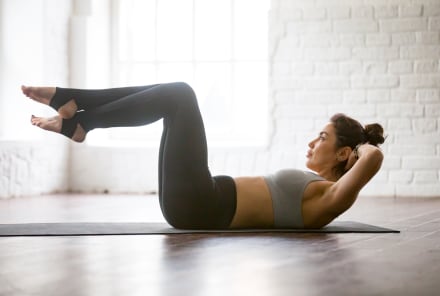Advertisement
Why Rest Days Are So Important For Physical & Mental Health


A person's relationship to exercise can fluctuate: Some days mustering up the motivation to get moving can be a challenge, while other times, your stamina is comparable to the Energizer Bunny's.
I fully support working toward new fitness goals, but adopting a frantic must must-work-out-every-day mindset can be dangerous. In fact, giving your mind and your body time to rest and recover will actually support, not derail, your goals.
Now, that doesn't mean parking yourself on the couch during every rest day. Instead, try adopting active rest days, where you're not training or working out intensely, but you're still getting in some light movement. Think walking, stretching, or doing a short, gentle yoga session.
Rest days should be spent decompressing and prioritizing self-care by getting extra sleep, keeping your body hydrated, eating nourishing meals, and just unwinding.
Breaking out of the mindset that working out every day is the "right" way to exercise can take time. But active rest days are crucial for meeting your fitness goals and for staying safe and healthy overall. Let me share four reasons why:
They help you get stronger.
When you work out, whether you're lifting weights, running, or doing a Pilates class, you create microscopic tears in your muscles. It's these tears that cause your muscles to ache after a particularly intense training session.
Rest days allow the body to replenish energy stores and repair damaged tissues. As your body repairs these tears, your muscles get stronger, which, over time, enables you to perform the same workout with less effort.
They reduce the chance of injuries.
Our bodies can only handle so much physiological stress. When we put too much strain on them, it can lead to overuse injuries (i.e., stress fractures, muscle strains, and joint pain). The time spent recovering from an injury like that just equals more time spent on the sidelines.
To stay strong and healthy, it's in your best interest to take at least one day per week to rest.
They can support your mental health and motivation.
From a psychological standpoint, taking a rest day can help recharge your mind, prevent burnout, and bolster your hunger for exercise. Working out can increase endorphins and energy levels, but when we're not allowing our bodies time to rest, it takes the fun right out of it.
If working out starts to feel like a burden or a chore, that's a sure sign you're not giving yourself enough rest days. If this is the case, take a couple of days off. Soon enough, you'll start to crave movement again.
They can help you sleep better.
Sleep is vital for all humans, and when you work out too hard and too consistently, your sleep patterns can start to get a little wonky. You may feel completely worn out yet struggle to fall asleep or wake up several times throughout the night.
This happens because exercising increases your body's production of cortisol1, and if you don't allow adequate rest time, your stress hormones will stay heightened. Taking a day or two to rest can help get your sleep back on track.
Bottom line.
If you're feeling worn out, experiencing any kind of pain, or are struggling to walk up the stairs because you're sore, it's time for a rest day. Even if you're not experiencing any of those effects, I recommend dedicating one or two days per week to active rest. Just listen to your body—you know it best.
Rest days are not a sign of laziness; they're a necessary part of a workout schedule, and they will help you crush your goals in a safer, healthier, and more sustainable manner. It's important to give yourself unapologetic permission to rest and to release any guilt you may have about taking it easy.

Short On Time? Try This Personal Trainer's 5-Minute Full-Body Workout
Krista Stryker, NSCA-CPT

Short On Time? Try This Personal Trainer's 5-Minute Full-Body Workout
Krista Stryker, NSCA-CPT

Short On Time? Try This Personal Trainer's 5-Minute Full-Body Workout
Krista Stryker, NSCA-CPT

Short On Time? Try This Personal Trainer's 5-Minute Full-Body Workout
Krista Stryker, NSCA-CPT









